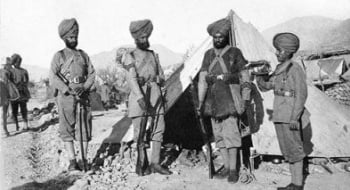Special Feature
This section lists articles that will or have appeared as a "Special Feature" on the SikhiWiki mainpage. If you would like to sponsor a new article to appear as a "special Feature" please add it to the discussion page. Many thanks.
On September 12, the Sikhs worldwide will remember with honor the supreme sacrifice of their brave comrades who for the security and safeguard of their country willingly laid down their lives. The bravery of these soldiers was inspired by the heart piercing message of their tenth Guru, Guru Gobind Singh.
O God, give me these boons
that never shall I shirk from doing good deeds
that never shall I fear when I go into battle
And that with surety I shall attain victory.
by Sri Guru Gobind Singh - the motto of the Sikh Regiment
Guru Nanak taught us the importance of caring and loving communities. He promoted and encouraged their birth and establishment.
He advocated the concept of fellowship; of closeness and affection between individuals; of non-discrimination and fairness among all societies. The Guru highlighted the importance of openness and transparency; of caring for others; of protecting and guardianship; of loving all.
These values are paramount to Sikhi and necessary for a rewarding and fruitful spiritual life.
The Guru helped to established many communities where the principles of caring, of community cohesion, of kindness and forgiveness, of sharing and respect for all were strongly emphasised. The fact that we all belong to the one same God, the Creator, Sustainer and the Destroyer is the root and the primary message of the Guru Granth, the Sikh holy scripture.
The code of behaviour and self-discipline of the individual was the first step - to have control over ones own vices and to establish ones virtues; .....More

Image courtesy of Buzzle
The Sikh faith condemns empty rituals and superstitions. The practice of blind rituals, worshipping of idols or inanimate objects, participating in religious fasts, pilgrimage to holy places, offering of food to sadhus (religious leaders), or believing in any such religious or other rites, superstitions or fads is rejected by Sikhism.
These pointless practises will not bring one closer to God or make one a better human being. In all societies round the world, through fear and uncertainty, members undertake in ritualistic and worthless behaviour at times of worry, uncertainty or trouble. These poor people, wrongly believe that undertaking these empty customs and penances will bring them special assistance from Waheguru or some other higher power.
Superstition is an irrational belief arising from ignorance or doubt. Many people all around the world are gripped by various superstitions and they live their lives in fear and uncertainty. Most of these fears are irrational and superfluous but they still cannot unbind themselves from these sometimes evil and false notions. Some common and well-known examples of superstitions are:
- "When a black cat crosses one's path, something will happen if one crosses the line where the cat passed. To "undo" either wait for someone who didn't know about the black cat to cross the path or think of another route." .....More
Daulat Rai, an Arya Samajist was living in India during the late 1800's and the early part of 1900's.
He was so disturbed by the publication of books by some Hindu activists whose writings maligned the Sikh Gurus that he was forced to pick up the pen himself. The now famous book: "Sahib-e-Kamal (par excellence) Guru Gobind Singh" was written by him.
In his book he reminded Punjabi and Hindus of the humiliation and degradation to which their ancestors were subjected under Mughal rule before the Khalsa liberated them. Quoting various historical sources, he wrote:
- Not only did Mughal invaders kill Hindus by the thousands, looted their properties and carried away men and women as slaves in the thousands, but also under some Muslim rulers Hindus were not allowed even the comforts of life like -- good clothes, good food, ride horses, wear turbans or keep good homes or valuables or even beautiful children or wives. .....More



